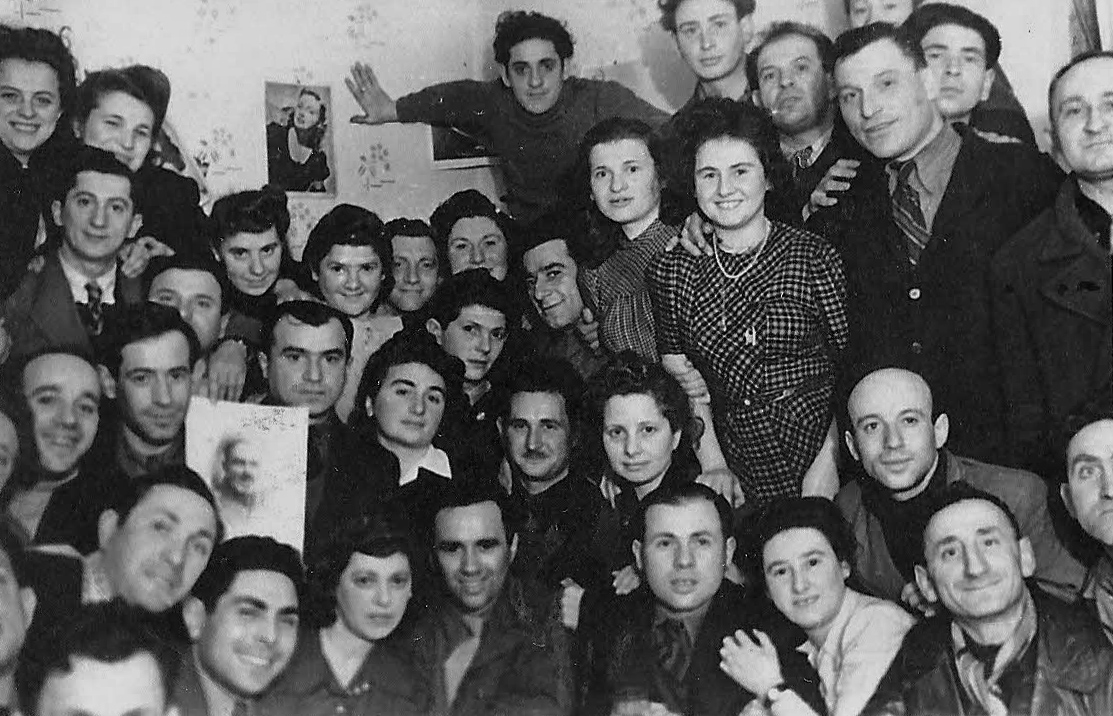Jews from Plonsk After the Holocaust
After the war, the few survivors of Plonsk began to search for their lost family and friends:
In the hearts of the survivors nestled the hope that, despite everything, they would find a family member… but miracles such as the resurrection of the dead, murdered and burned did not come to pass and it was so difficult to become accustomed to the bitter reality that you would never see your dear family, friends and neighbors again… we couldn't even lay a wreath upon their graves, because Asmodeus [the king of the demons] has spread their holy ashes to the four corners of the earth."
Yaakov Neta, Sefer Plonsk, p. 527
The only things that remained from the once lively, Jewish Plonsk were the ruins of the ghetto and a few destroyed alleyways where there was once Jewish life. In 1946, there were only 11 Jewish families in Plonsk. Most of the survivors had gathered in the DP camps in Germany, the majority in the town of Zeilsheim, near Frankfurt. At the Zeilsheim DP camp, there was a committee of ex-Plonsk residents in contact with those living in the US that sought to rehabilitate the survivors from the town.
After the Holocaust, most of the remaining Jews from Plonsk left Germany for Eretz Israel on illegal immigrant ships. They fought in the War of Independence:
Mordechai (Motek) Gutman was born in Plonsk in 1924 to Aharon and Feiga. Mordechai survived the Shoah and was only survivor of his entire family. During the War of Independence, he fought in the Harel Battalion. He was killed on 1 June 1948, in a battle over Har Adar in the Judean Mountains.
Yitzhak Dubno, the son of Moshe and Rachel from Plonsk, was born in 1913 and emigrated to Eretz Israel in 1933. During the War of Independence, he headed the defense of Kibbutz Negba. He was killed in battle on 21 May 1948.
Yisrael Danziger was the son of Yehoshua and Hava from Plonsk, and the great-grandson of Rabbi Moshe Gershon Hacohen from Plonsk. Yisrael was born in 1931 in Tel Aviv. During the War of Independence, he served as a paramedic in the Negev Battalion, and was killed on 6 June 1948 in a battle over Ashdod.
Avraham Zisserman, the son of Shlomo and Nechama and the grandson of Zeev Kanaster from Plonsk, was born in 1921. When he was three years old, his family emigrated from Poland to Eretz Israel. During the War of Independence, he fought in the Jerusalem area, and was killed on 8 January 1948.
Avraham (Avrahamik) Cohen (Goldstein), the son of Uri and Rivka, and the grandson of Moshe Cohen from Plonsk, was born in Jerusalem in 1931. Avraham was killed in battle over Nabi Yosha in the Galilee on 20 April 1948.
Yerubaal Lavi was born in 1924, the son of Shlomo Lavi, who was born in Plonsk and immigrated to Eretz Israel during the "Second Aliyah" (a large wave of immigration during the years 1904-1914), and Rachel, one of the founders of Kibbutz Ein Harod. Yerubaal was killed in the War of Independence, in a battle that took place in the Gilboa Mountains, on 19 March 1948.
Hillel Lavi was born in 1929, the son of Shlomo Lavi, who was born in Plonsk and and immigrated to Eretz Israel during the "Second Aliyah", and Rachel, one of the founders of Kibbutz Ein Harod. Hillel was killed during the first lull of the War of Independence, accompanying a supply convoy to the besieged Kfar Darom in the Negev on 14 June 1948.
Yikhat (Yakush) Rubenstein, the son of Shlomo and Henia, and the grandson of Yekutiel (Koffman) Levkowitz from Plonsk, was born in 1927 in Kfar Malal. Yikhat was killed on 9 June 1948 in a battle at Latrun, during the War of Independence.
Levi Speigelman was born in 1902 in Plonsk to Avraham and Haya. In 1921, he emigrated to Eretz Israel. On 16 December 1947, he was mortally wounded in an attack on a convoy in which he was travelling from the Dead Sea to Jerusalem. He died of his wounds on 4 January 1948.
In 1959, only four Jews were living in Plonsk. The building of the synagogue that had held prayers for over 150 years had been destroyed in 1956 "in order to widen the street." A warehouse was erected where the Beit Midrash had once stood. The mikveh had been destroyed by the Germans and the "Community House" on Warsawska Street given to Poles for housing. The Beit Midrash of Yitzhak Cohen, where Zionism had once flourished in Plonsk, was torn down, and its stones taken for a different purpose. The Jewish cemetery in Plonsk was an expansive, open field, without a fence.
Once there were graves here, where generations upon generations were buried, among them tzaddikim [righteous people] and talmidei chachamim [learned scholars], important rabbis and laypeople, and regular Jewish men and women.
Mordechai Halmish, Sefer Plonsk, p. 541
Where are the gravestones and the fence? I asked.
It was all destroyed by the Germans…

